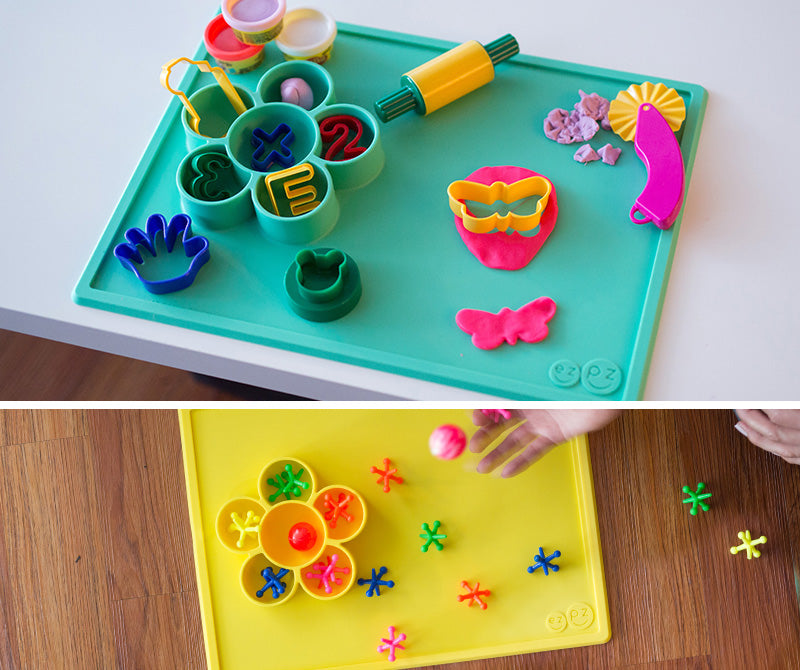Do you know that play is a developmental milestone? There are several different stages of play that apply to different age ranges, and there are many ways to help facilitate play for children. Here are some guidelines to help you understand the different play types plus some product + tips to enrich play!
Solitary Play (playing alone): 0-2 years of age
During this developmental stage of play children engage in play by themself. There is limited interest or interaction with other children. An example of this type of play is a child joyfully playing with play dough alone.
Spectator Play (watching play): 2-2 ½ years of age
During this stage of play the child is more interested in other children and will tend to observe other children playing (and not play with them). A good example is when a child who has never seen the game of Jacks stands nearby watching as children play Jacks.
Parallel Play (playing near others): 2 ½-3 years of age
Parallel play is when a child excitedly plays near others, but may not play with them. The kids are playing individually in a group setting. During a play date, for example, Abby and her friend Anna help make lunch. They make their own tacos at the toddler taco bar mom set up for them. They are playing with the food near each other, though primarily engaged in their own (but similar) activity.
Associative Play (playing together but not working together): 3-4 years of age
During this stage of play a child will prefer to play with certain children, and friendships start to emerge. For example, two children may be talking to each other and playing, but not working together to create something. For example, Chase and Drew are talking to each other while they make their own snack bag craft. They are not operating together as a team, but they are communicating and playing together.
Co-operative Play (playing and working together): 4-6 years of age
This type of play is when a child will play with other children with a similar “goal” in mind. During crafting time, a group of kids are talking and playing with dyed uncooked pasta shells. They decide to work together as a team to build the same thing, a beautiful holiday necklace for their teacher. This illustration, as well as playing board games, is an example of co-operative play.
To help your child follow these developmental stages and learn to play successfully, try using these three tips!
-
Plan: Planning the activity in advance will help you and your child enjoy an organized slot of time in your stressful day. At first, keep the activity short, and you can work up to several play activities and a structured environment they can learn from. For some fun food and crafting ideas to get you started, check out our blog for inspiration!
-
Pre-teach: It is important to teach your child how to play by themselves and with others appropriately, and pre-teaching (or practicing) activities is an excellent strategy. Practicing a planned activity in advance helps children prepare for winning or losing, improves social skills and helps them problem solve. It is a technique I often use with children who are shy, as it helps them feel more comfortable engaging in an activity they are familiar with. This also helps kids reach other stages of development involving language, cognitive, emotional and physical milestones…all of which are developed through play!
- Provide Reinforcement: As you observe your child going through the stages of play, your input and positivity is essential. By providing praise and encouragement you build their self-confidence and can guard against the constant interruption of “mom watch me!” Your positive reinforcement in these early years will set the groundwork for future learning, including reading, handwriting and algebra.
What are some ways you encourage play with your children? What are your favorite family games? How do you facilitate play during your child’s play dates? Tell us how you have used the Play Mat for developing play. #ezpzfun #playmat #play #developmental



